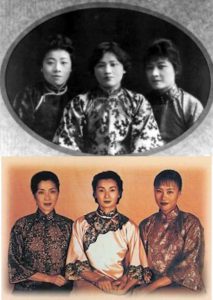HIST4180RH Topic Studies in Modern Chinese History:History of Modern China
2020-2021年度 第二學期
時間TBA
地點TBA
語言英語
課程講師 何曉清 ((852) 3943 7128 / rowenahe@cuhk.edu.hk)
助教 YU Wing Yun Verna

(Images of the Soong sisters in their youth and in the movie The Three Soong Sisters)
COURSE DESCRIPTION
This course is an introductory survey of Modern Chinese history from the early nineteenth to the late-twentieth centuries, spanning a period of enormous change from late imperial China to the post-Mao People’s Republic of China. It explores the developmental trajectory of Chinese society, politics, and culture in the rapidly changing domestic and international contexts over two centuries. Employing both chronological and thematic approaches, we will review historical narratives as well as examine different historical interpretations of the forces that have shaped modern China. Using primary and secondary sources, including materials of state-sponsored version of history presented by the Chinese Communist Party as well as that of independent historians, students will learn how to evaluate, to scrutinize, to compare and contrast historical evidence, and to develop skills to think, write, and speak critically and analytically about the past. We will also have the opportunity to engage in scholarly dialogues with authors of some of the books that we read for the course—to learn from their experience to present history within historical contexts, and to identify continuities and changes, and understand how to evaluate critically versions of modern Chinese history that may be distorted and manipulated for political purposes. In other words an important feature of this course will be the critical examination of the contemporary relevance of China’s past, the challenges of the ongoing contest between state-imposed interpretations of history and the independent pursuit of historical knowledge, and its implications on China’s future and its relationship with rest of the world.
ASSESSMENT
- Class Participation (30%)
- Presentation (10%)
- Final Project (60%)
COURSE MATERIALS
Each week’s reading will focus on one theme/topic that will generally follow the chronological sequence. In addition to reading required texts, we will watch films and documentaries relevant to the period we cover. These visual materials aim to facilitate students’ understanding of history through human experience, and to eventually cultivate students’ personal moral engagement as well as historical consciousness and intellectual understanding of the world. The history that we are exploring is not just about dates, names, and numbers, but timeless questions such as values and choices, conflict and power, love and betrayal.
Books for the course will be placed on reserve in the library. Reading materials and links to the films and documentaries will be available on course Blackboard. Daily news articles will be forwarded through a class mailing list that we will create during the first week.
Recommended Readings:
- Yu, Ying-Shih (2016). Chinese History and Culture (Volume 2): Seventeenth Century through Twentieth Century.Columbia University Press.
- Paul Evans (1988). John Fairbank and The American Understanding of Modern China.
- Holcombe, C. (2017). A History of East Asia: From the Origins of Civilization to the Twenty-First Century. Cambridge University Press.
- Jonathan Spence (1991). The Search for Modern China. Norton.
- Fairbank and Goldman (2006). China: A New History. Cambridge: Harvard University Press.
- Paul Cohen (1997). History in Three Keys. Columbia University Press.
- A.G. Robers (2006). A History of China. Palgrave Macmillan.
- Grasso, Corrin, & Kort (2004). Modernization and Revolution in China. E. Sharpe.
Alexander V. Pantsov with Steven I. Levine (2012). Mao: The Real Story. Simon & Schuster
Andrew G. Walder, China under Mao: A Revolution Derailed (Harvard University Press, 2017)
Yang Jisheng, Tombstone The Great Chinese Famine, 1958-1962 (Farrar, Straus and Giroux, 2012)
Pepper, Suzanne (1999). Civil War in China: The Political Struggle, 1945-1949. Lanham: Rowman & Littlefield.
Merle Goldman (1967). Literary Dissent in Communist China. Harvard University Press.
Strauss, Julia, ed. The History of the PRC (1949-1976). Cambridge: Cambridge University Press, 2007.
Goldman, M (1981). China’s Intellectuals: Advice and Dissent, Cambridge, MA: Harvard University Press.
MacFarquhar, R (1974). The Hundred Flowers Campaign and the Chinese Intellectuals, London: Octagon Press.
MacFarquhar, R (1983). The Origins of the Cultural Revolution: The Great Leap Forward, Oxford: Oxford University Press.
Baum, Richard and Frederick C. Teiwes, Ssu-Ch’ing (1968). The Socialist Education Movement of 1962-1966 (Berkeley: University of California Center for Chinese Studies.
Leese, Daniel (2011) Mao Cult: Rhetoric and Ritual in China’s Cultural Revolution, Cambridge: Cambridge University Press.
Esherick, Joseph W. Paul G. Pickowicz, and Andrew G. Walder, eds (2006), The Chinese Cultural Revolution as History. Stanford: Stanford University Press.
White, Lynn T (1989). Policies of Chaos: The Organizational Causes of Violence in China’s Cultural Revolution. Princeton: Princeton University Press.
Brown, Jeremy (2012). City Versus Countryside in Mao’s China: Negotiating the Divide. New York: Cambridge University Press.
Goldstein, Melvyn C (1997). The Snow Lion and the Dragon: China, Tibet, and the Dalai Lama. Berkeley: University of California Press.
Mullaney, Thomas S (2011). Coming to Terms with the Nation: Ethnic Classification in Modern China. Berkeley: University of California Press.
Luthi, Lorenz M (2008). The Sino-Soviet Split: Cold War in the Communist World. Princeton: Princeton University Press.
Millward, James. (2009) Eurasian Crossroads: A History of Xinjiang (Columbia University Press)
Rowe, William T. (20012) China’s Last Empire: The Great Qing (Harvard University Press)
Pantsov, Alexander V. with Steven I. Levine (2015) Deng Xiaoping: A Revolutionary Life (Oxford University Press)
Bianco, Lucien. (2018) Stalin and Mao: A Comparison of the Russian and Chinese Revolutions (The Chinese University Press)
Bergere, Marie-Claire. (2000) Sun Yat-sen (Stanford University Press)
請注意大學有關學術著作誠信的政策和規則,及適用於犯規事例的紀律指引和程序。詳情可瀏覽網址:http://www.cuhk.edu.hk/policy/academichonesty/。
學生遞交作業時,必須連同已簽署的聲明一併提交,表示他們知道有關政策、規則、指引及程序。
- 如屬小組習作,則所有組員均須簽署聲明;所有組員(不論有否簽署聲明及不論有否直接或間接撰寫有問題的內容)均須負上集體責任及受到懲處。
- 如作業以電腦製作、內容以文字為主,並經由大學「維誠」系統 (VeriGuide) 提交者,學生將作業的電子檔案上載到系統後,便會獲得收據,收據上已列明有關聲明。
未有夾附簽署妥當的聲明的作業,老師將不予批閱。
學生只須提交作業的最終版本。
學生將作業或作業的一部份用於超過一個用途(例如:同時符合兩科的要求)而沒有作出聲明會被視為未有聲明重覆使用作業。學生重覆使用其著作的措辭或某一、二句句子很常見,並可以接受,惟重覆使用全部內容則構成問題。在任何情況下,須先獲得相關老師同意方可提交作業。